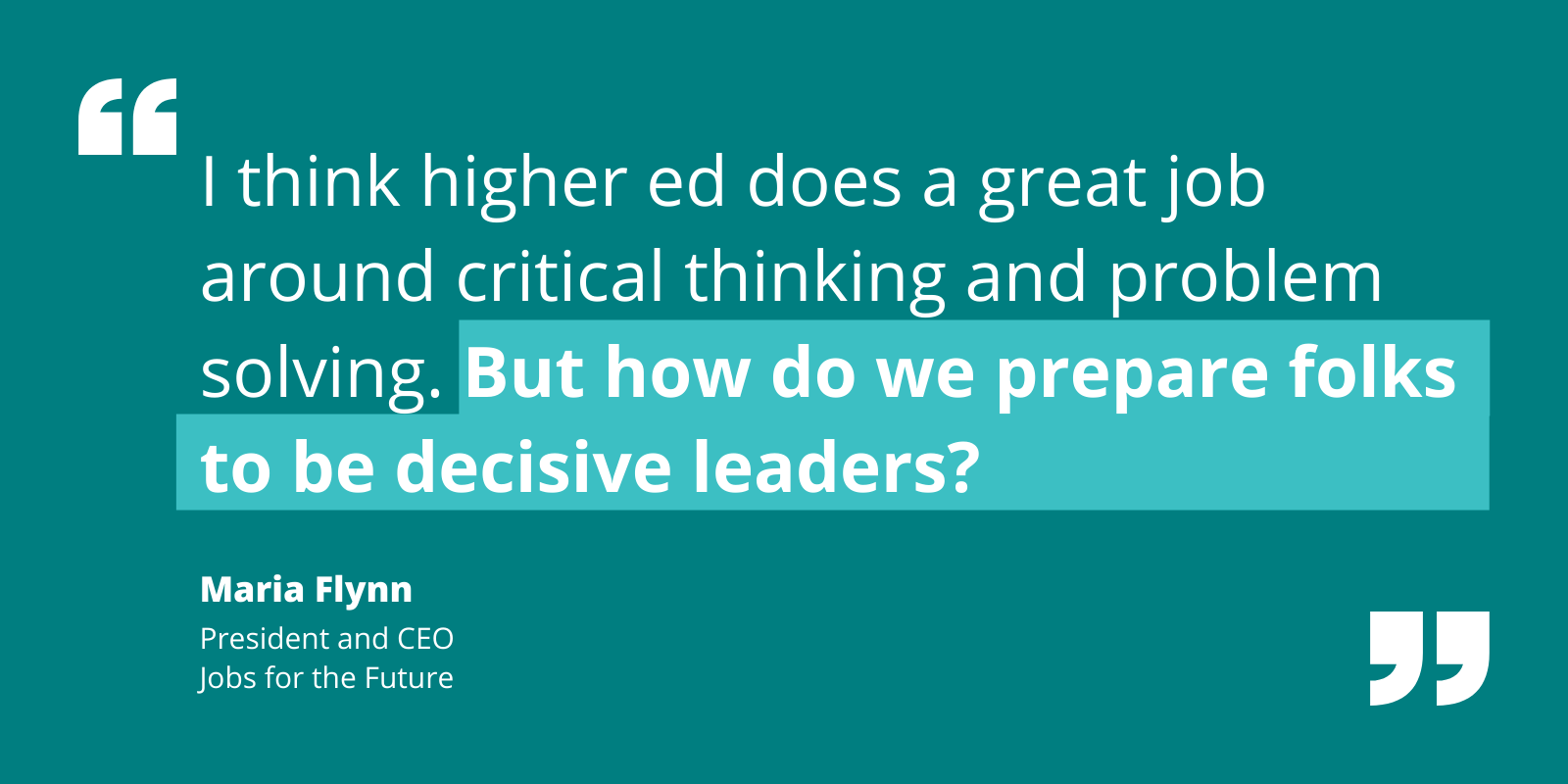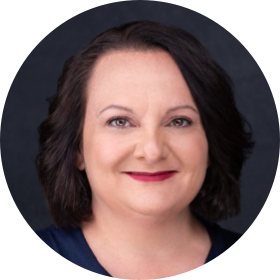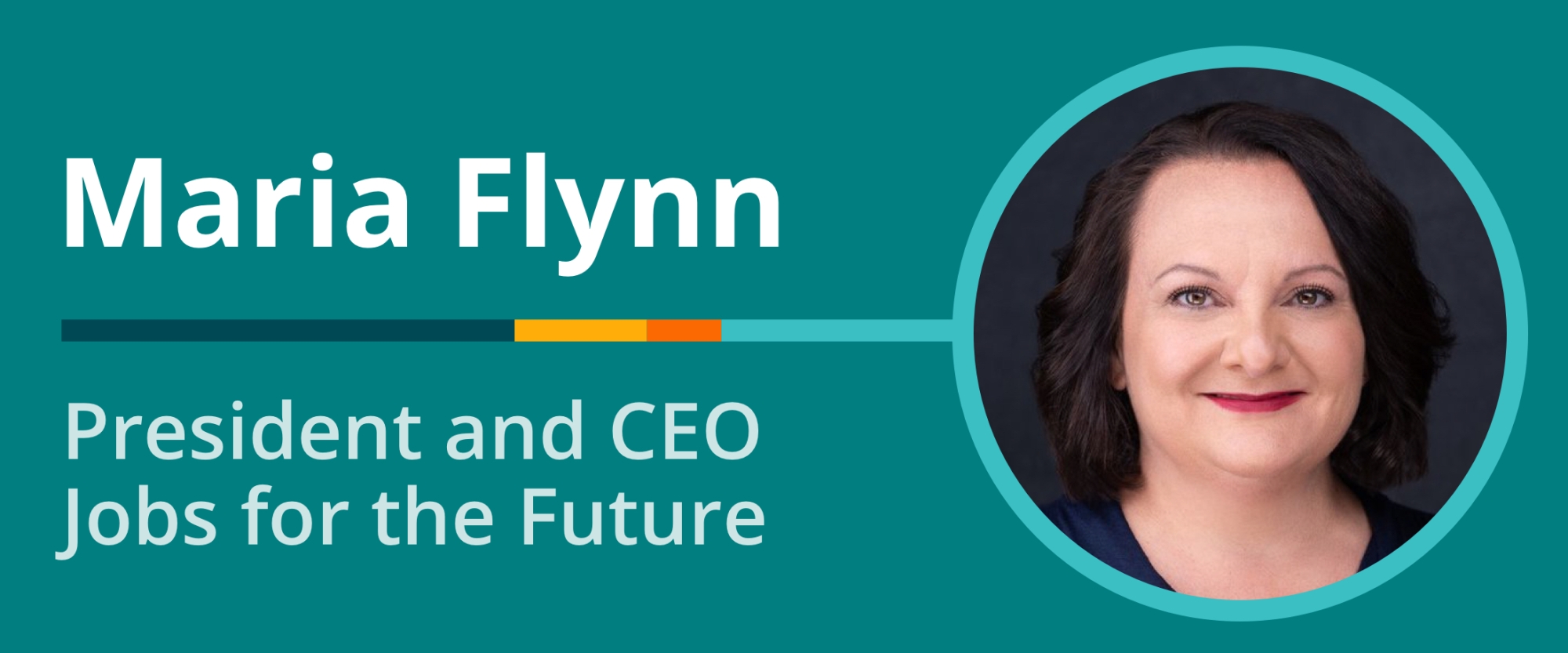We sat down with Maria Flynn, President and CEO of Jobs for the Future, for our Weekly Wisdom Podcast. President Flynn spoke about JFF's role in connecting college graduates with employment opportunities, the skills required in an evolving career marketplace, the challenges of scaling a nonprofit within a volatile ecosystem, and her best advice for both seasoned and emerging leaders.
The Learning-to-Work Ecosystem
For those unfamiliar with Jobs for the Future, President Flynn was happy to clarify its role. "We work to drive transformation in the U.S. education workforce systems," she said. "And I like to say that we sit at the intersection between workforce and education, and policy and practice. So foundations call us when they are looking for a nonprofit to lead or manage major initiatives. The federal government calls us to do work on issues of apprenticeship and career and technical education. Increasingly, corporations are coming to us to help them implement worker-centered policies and become what we call impact employers. And we also work directly with a lot of higher ed institutions, both two-year and four-year, so we have a large, diverse client base."
While the UIA's primary focus is increased graduation rates, we're also interested in smooth transitions between college and the labor market.
"When I think about the learning-to-work ecosystem," President Flynn told us, "I define it pretty broadly to include philanthropy, corporations, government research organizations, startups, VCs – we have so many players focused on this space. At JFF, we try to be the big tent, or the convener that can bring those different stakeholders and partners together, because people get a little too insular. I think in order for us to get the type of impact and transformation that we want to see, we need to start connecting these dots in different ways."
Tomorrow's Entrepreneurs and Leaders
Given the volatile nature of the economy and the changing demands of the job market, we wondered if students are learning the skills they'll actually need to participate. President Flynn believes that institutions can teach entrepreneurial skills through more applied learning.
"I think that's where connections to work-based learnings, internships, and apprenticeship become important," she said. "I feel like every year we see a new study that says, 'These are the five or ten soft skills or employability skills that employers are looking for.' And in the decades that I've been working in this space, it seems those lists don't change very much, right? So maybe it's not asking the question of what are the skills. By and large, we know what they are. Is it more like how do we teach and assess those skills?"
However these skills are taught, she'd like to see more decisiveness and confidence in the mix – leadership qualities, in other words. "I think higher ed does a great job around critical thinking and problem solving," she explained. "But how do we prepare folks to be decisive leaders? To help them quickly assess information, make a decision, and move forward? I think sometimes higher ed can over-index on debate, which in the workplace can cause some swirl, right? So the more we can start thinking about how do you take the content and those concepts that we're learning and move them into action, I think that would be important."

Scaling for the Next Opportunities and Challenges
As an integral part of JFF's leadership team over the past 14 years, one of President Flynn's recent accomplishments has been scaling the organization from a Boston-based team to a national network.
"I know there is a lot of debate around whether nonprofits should operate like a business or not," she reflected. "But you have to be intentional about how you operate in the market; how are you meeting the needs of your customers? How are you not just meeting the needs of funders? So I think there are a lot of delicate dances to figure out as a nonprofit, and I think we're really well positioned right now for the next couple of years ahead."
When we asked about how she's met her biggest challenges, she told us about launching JFFLabs. "It's our market-facing arm or innovation engine," she explained. "I would say that was an opportunity and a challenge, in the sense that we began working with a whole array of new clients. We brought in different types of leaders that were new to JFF or the education and workforce space in general. I think it was the right move to make at that time, because I felt that, going into the pandemic last year, if we hadn't made some of those shifts, as an organization we would have been caught flat-footed. So we were able to move into looking at technology-driven solutions, at impact investing, at the work of corporations more specifically. So I think adding on that type of new approach to a legacy organization is certainly a challenge that had to be navigated. And then I think operating a national nonprofit in this space during the Trump Administration was challenging as well. There were a lot of careful decisions to be made, especially because federal government work is a core piece of our business. So a lot of navigational issues there."
Even though President Flynn spent the first half of her career at the U.S. Department of Labor across three presidential administrations, she admitted, "What surprises me is just how hard some of these foundational rocks are to move within the system. A lot of the changes that we have seen are around the borders, I would say. And I think it's true for higher ed. I think it's true for more traditional workforce development. There are just some of those core central issues that I think have, for decades, seemed insurmountable. Department turf, that's where things really tend to get bogged down. I'm hopeful that we're at a moment where some of those things can be questioned more fundamentally and we'll see some big changes."
Authenticity, Unpopularity, and Networking
As we do with many of our guests, we ended by asking President Flynn about the best career advice she ever got, and also the advice she most frequently offers to people who are thinking about leadership.
"I would say the most helpful advice I received was just the importance of being an authentic leader," she told us. "I think that that's just a key to leadership, being authentic to who you are. And then you build teams around yourself to complement your skills. And advice I give others, one is being OK with making the unpopular decision, with not being loved by everyone. This may be particularly true for women. I think the importance of being able to stand by those decisions is key. And I would also say sometimes leadership can be lonely, and so developing a network of peers that you can talk with as the challenges ebb and flow, I think, is key as well."
Note: This interview in the Weekly Wisdom Series originally aired on June 14, 2021 as part of the University Innovation Alliance’s Innovating Together Podcast, appearing live on Facebook, Twitter, and LinkedIn.
Links Mentioned in This Episode
• Jobs for the Future
• Impact employers (JFF's model for companies whose business strategies include a positive imnpact on people as well as profit)
• JFFLabs (a JFF initiative for partnering with business sector visionaries to foster innovation)
Bios of Guest and Co-Hosts

Guest: Maria Flynn, President and CEO, Jobs for the Future
Maria Flynn is president and CEO of JFF, a national nonprofit driving transformation in America's workforce and education systems. She is regarded as an authority on the future of work, the role of technology in the labor market, career pathways for underserved individuals, and employer engagement. In 2018, she launched JFF Labs to bridge the traditional education and workforce systems with innovative approaches and technology-enabled solutions. Before becoming CEO in 2016, Maria led the Building Economic Opportunity Group as JFF’s senior vice president, helping entry-level workers advance while enabling employers to build and sustain a productive workforce. Prior to joining JFF in 2007, Maria served with the U.S. Department of Labor's Senior Executive Service in high-level positions involving employment, training, and research. At DOL’s Employment and Training Administration, she oversaw youth and adult policy, supervised research and evaluation strategy, and managed the agency's $12 billion annual budget. A nationally recognized expert on workforce development, Maria speaks regularly at corporate and nonprofit events, including the Council on Foreign Relations' “Training for 21st-Century Jobs” panel, the SOCAP18 conference, and the Fortune CEO Initiative. She was recognized by The Commonwealth Institute and The Boston Globe as CEO of one of the top 100 Women-Led Businesses in Massachusetts for 2018. Maria is regularly interviewed in the media about the future of work and has been quoted in Bloomberg News, The Boston Globe, BuzzFeed, and Fast Company, among others.

Co-Host: Bridget Burns, Executive Director, University Innovation Alliance
Dr. Bridget Burns is the founding Executive Director of the University Innovation Alliance (UIA). For the past decade, she has advised university presidents, system chancellors, and state and federal policy leaders on strategies to expand access to higher education, address costs, and promote completion for students of all backgrounds. The UIA was developed during Bridget’s tenure as an American Council on Education (A.C.E.) Fellowship at Arizona State University. She held multiple roles within the Oregon University System, including serving as Chief of Staff and Senior Policy Advisor, where she won the national award for innovation in higher education government relations. She was a National Associate for the National Center for Public Policy and Higher Education, and has served on several statewide governing boards including ones governing higher education institutions, financial aid policy, and policy areas impacting children and families.

Co-Host: Doug Lederman, Editor and Co-Founder, Inside Higher Ed
Doug Lederman is editor and co-founder of Inside Higher Ed. With Scott Jaschik, he leads the site's editorial operations, overseeing news content, opinion pieces, career advice, blogs and other features. Doug speaks widely about higher education, including on C-Span and National Public Radio and at meetings and on campuses around the country. His work has appeared in The New York Times and USA Today, among other publications. Doug was managing editor of The Chronicle of Higher Education from 1999 to 2003, after working at The Chronicle since 1986 in a variety of roles. He has won three National Awards for Education Reporting from the Education Writers Association, including one for a 2009 series of Inside Higher Ed articles on college rankings. He began his career as a news clerk at The New York Times. He grew up in Shaker Heights, Ohio, and graduated in 1984 from Princeton University. Doug and his wife, Kate Scharff, live in Bethesda, MD.
About Weekly Wisdom
Weekly Wisdom is an event series that happens live on Facebook, Twitter, and LinkedIn. It also becomes a podcast episode. Every week, we join forces with Inside Higher Ed and talk with a sitting college president or chancellor about how they're specifically navigating the challenges of this moment. These conversations will be filled with practicable things you can do right now by unpacking how and why college leaders are making decisions within higher education. Hopefully, these episodes will also leave you with a sense of optimism and a bit of inspiration.
Rate, Review & Subscribe
Learn why hundreds of people have rated this new podcast 5 stars! Please join others and rate and review this podcast. This helps us reach and inform more people -- like you -- to help increase the number and diversity of college graduates in the United States.
Click here, scroll to the bottom, tap to rate with five stars, and select “Write a Review.” Then be sure to let us know what you loved most about the episode! Also, if you haven’t done so already, subscribe to the podcast. We’ll be adding a bunch of bonus episodes to the feed and, if you’re not subscribed, there’s a good chance you’ll miss out.

